Literature Review: Emerging Trends and Challenges in Tourism Sector
VerifiedAdded on 2023/01/06
|10
|2648
|74
Literature Review
AI Summary
This literature review examines emerging issues in the tourism industry, focusing on sustainable development and eco-tourism practices, specifically in Amsterdam. It explores the external environment's influence on the tourism sector, analyzes emerging challenges such as taxation and security, and assesses the impact of recent technologies like augmented reality and biometrics. The review also covers the importance of tourism policies, stakeholder participation, and pro-poor tourism initiatives in developing countries. The research draws on various sources including journals, articles, and scholarly works to provide a comprehensive overview of the current state and future trends within the international tourism landscape.
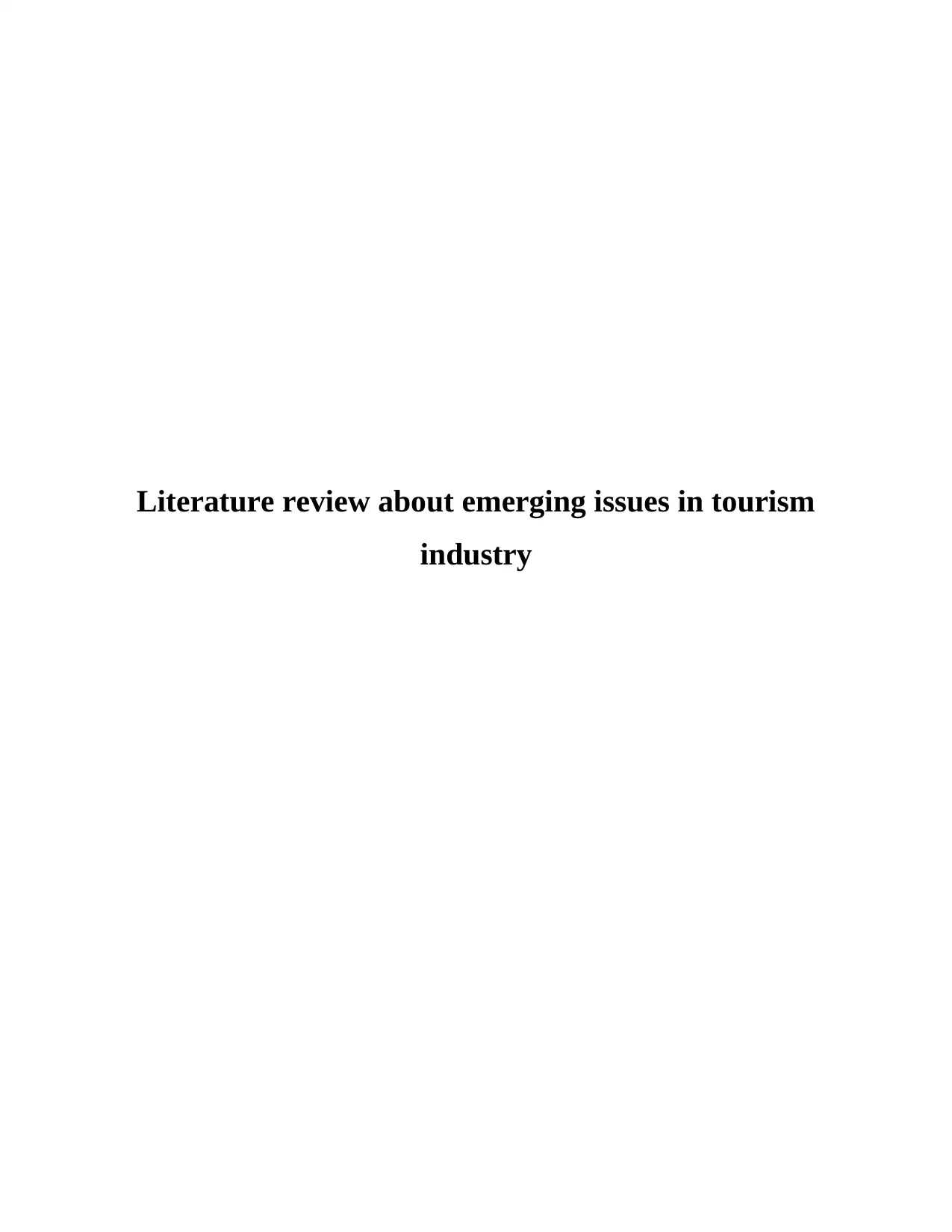
Literature review about emerging issues in tourism
industry
industry
Paraphrase This Document
Need a fresh take? Get an instant paraphrase of this document with our AI Paraphraser
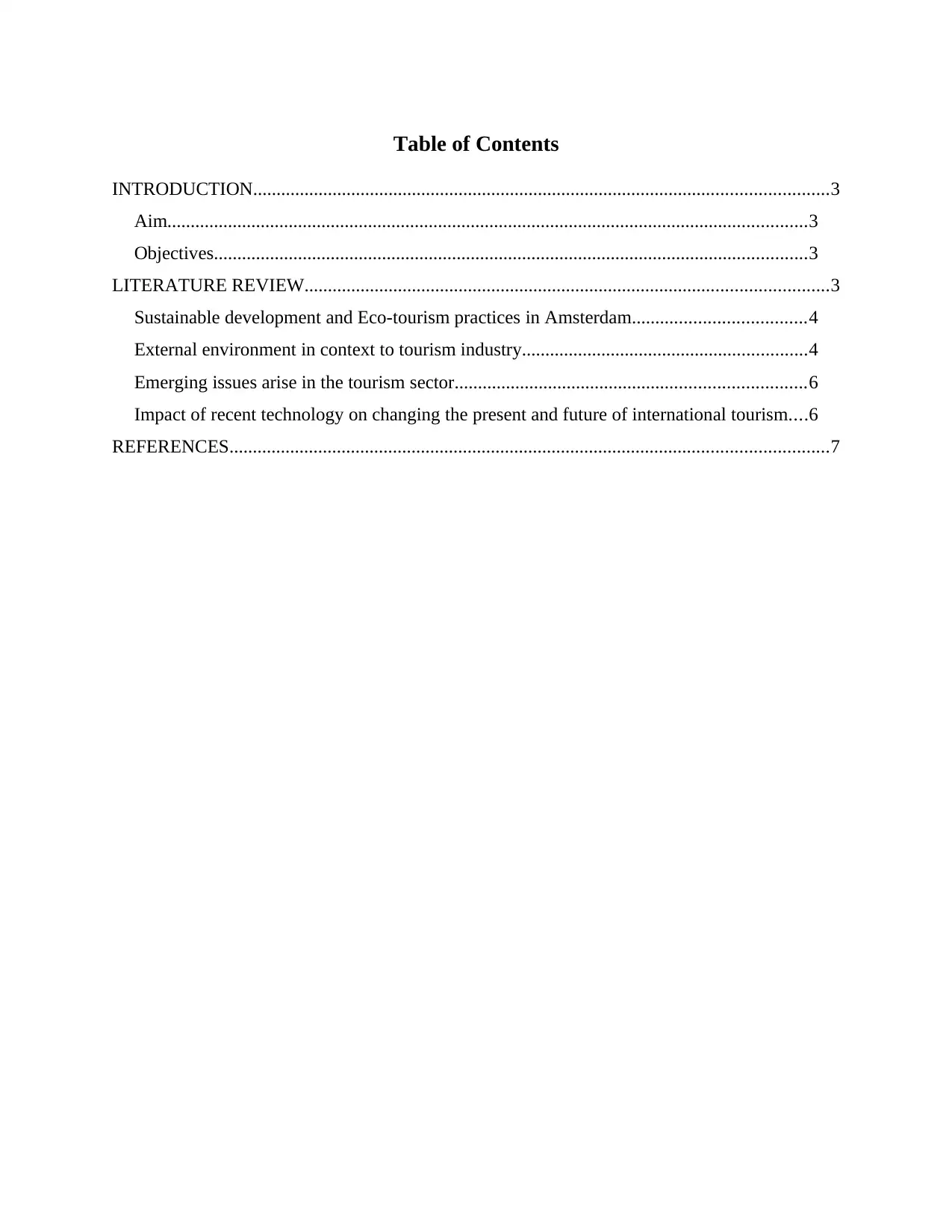
Table of Contents
INTRODUCTION...........................................................................................................................3
Aim.........................................................................................................................................3
Objectives...............................................................................................................................3
LITERATURE REVIEW................................................................................................................3
Sustainable development and Eco-tourism practices in Amsterdam.....................................4
External environment in context to tourism industry.............................................................4
Emerging issues arise in the tourism sector...........................................................................6
Impact of recent technology on changing the present and future of international tourism....6
REFERENCES................................................................................................................................7
INTRODUCTION...........................................................................................................................3
Aim.........................................................................................................................................3
Objectives...............................................................................................................................3
LITERATURE REVIEW................................................................................................................3
Sustainable development and Eco-tourism practices in Amsterdam.....................................4
External environment in context to tourism industry.............................................................4
Emerging issues arise in the tourism sector...........................................................................6
Impact of recent technology on changing the present and future of international tourism....6
REFERENCES................................................................................................................................7
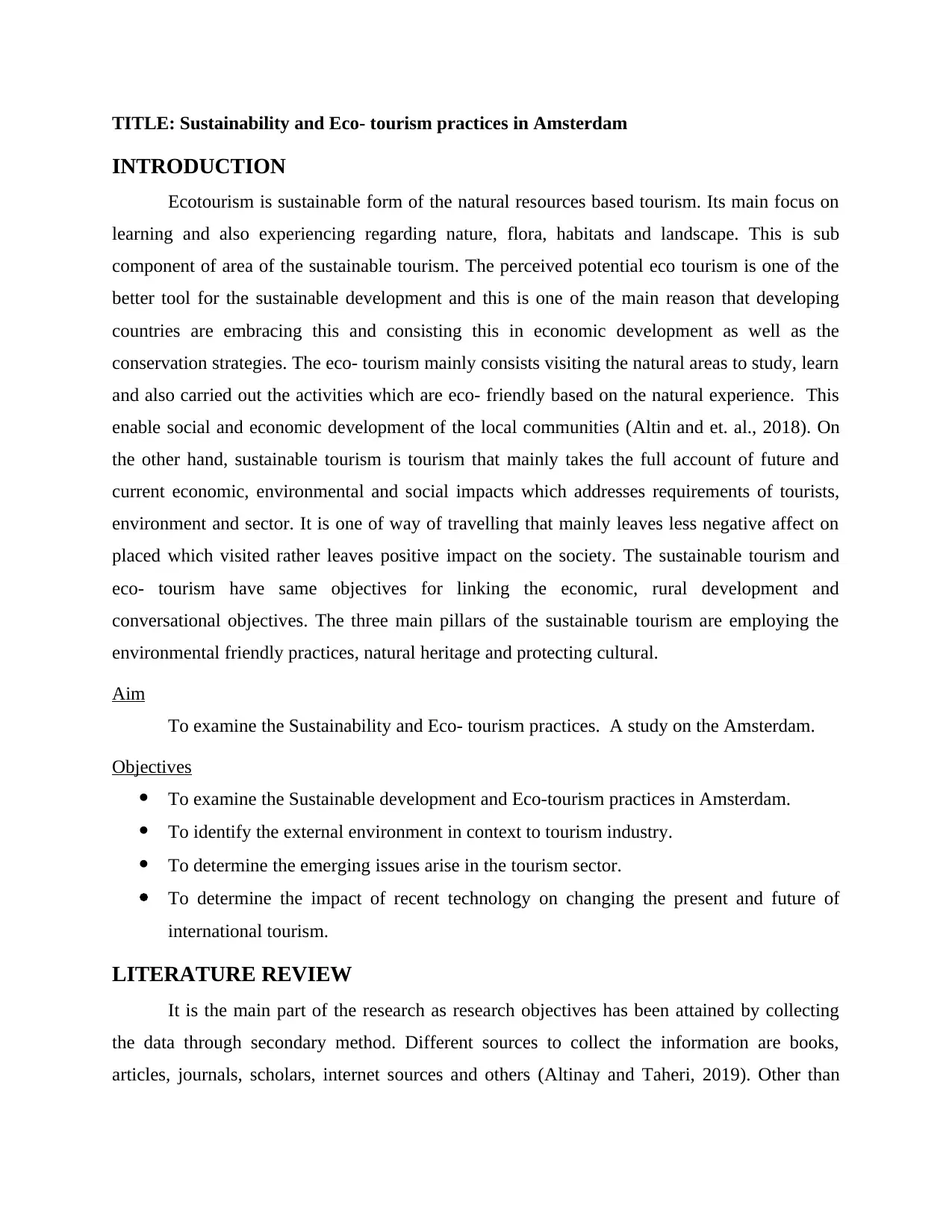
TITLE: Sustainability and Eco- tourism practices in Amsterdam
INTRODUCTION
Ecotourism is sustainable form of the natural resources based tourism. Its main focus on
learning and also experiencing regarding nature, flora, habitats and landscape. This is sub
component of area of the sustainable tourism. The perceived potential eco tourism is one of the
better tool for the sustainable development and this is one of the main reason that developing
countries are embracing this and consisting this in economic development as well as the
conservation strategies. The eco- tourism mainly consists visiting the natural areas to study, learn
and also carried out the activities which are eco- friendly based on the natural experience. This
enable social and economic development of the local communities (Altin and et. al., 2018). On
the other hand, sustainable tourism is tourism that mainly takes the full account of future and
current economic, environmental and social impacts which addresses requirements of tourists,
environment and sector. It is one of way of travelling that mainly leaves less negative affect on
placed which visited rather leaves positive impact on the society. The sustainable tourism and
eco- tourism have same objectives for linking the economic, rural development and
conversational objectives. The three main pillars of the sustainable tourism are employing the
environmental friendly practices, natural heritage and protecting cultural.
Aim
To examine the Sustainability and Eco- tourism practices. A study on the Amsterdam.
Objectives
To examine the Sustainable development and Eco-tourism practices in Amsterdam.
To identify the external environment in context to tourism industry.
To determine the emerging issues arise in the tourism sector.
To determine the impact of recent technology on changing the present and future of
international tourism.
LITERATURE REVIEW
It is the main part of the research as research objectives has been attained by collecting
the data through secondary method. Different sources to collect the information are books,
articles, journals, scholars, internet sources and others (Altinay and Taheri, 2019). Other than
INTRODUCTION
Ecotourism is sustainable form of the natural resources based tourism. Its main focus on
learning and also experiencing regarding nature, flora, habitats and landscape. This is sub
component of area of the sustainable tourism. The perceived potential eco tourism is one of the
better tool for the sustainable development and this is one of the main reason that developing
countries are embracing this and consisting this in economic development as well as the
conservation strategies. The eco- tourism mainly consists visiting the natural areas to study, learn
and also carried out the activities which are eco- friendly based on the natural experience. This
enable social and economic development of the local communities (Altin and et. al., 2018). On
the other hand, sustainable tourism is tourism that mainly takes the full account of future and
current economic, environmental and social impacts which addresses requirements of tourists,
environment and sector. It is one of way of travelling that mainly leaves less negative affect on
placed which visited rather leaves positive impact on the society. The sustainable tourism and
eco- tourism have same objectives for linking the economic, rural development and
conversational objectives. The three main pillars of the sustainable tourism are employing the
environmental friendly practices, natural heritage and protecting cultural.
Aim
To examine the Sustainability and Eco- tourism practices. A study on the Amsterdam.
Objectives
To examine the Sustainable development and Eco-tourism practices in Amsterdam.
To identify the external environment in context to tourism industry.
To determine the emerging issues arise in the tourism sector.
To determine the impact of recent technology on changing the present and future of
international tourism.
LITERATURE REVIEW
It is the main part of the research as research objectives has been attained by collecting
the data through secondary method. Different sources to collect the information are books,
articles, journals, scholars, internet sources and others (Altinay and Taheri, 2019). Other than
⊘ This is a preview!⊘
Do you want full access?
Subscribe today to unlock all pages.

Trusted by 1+ million students worldwide
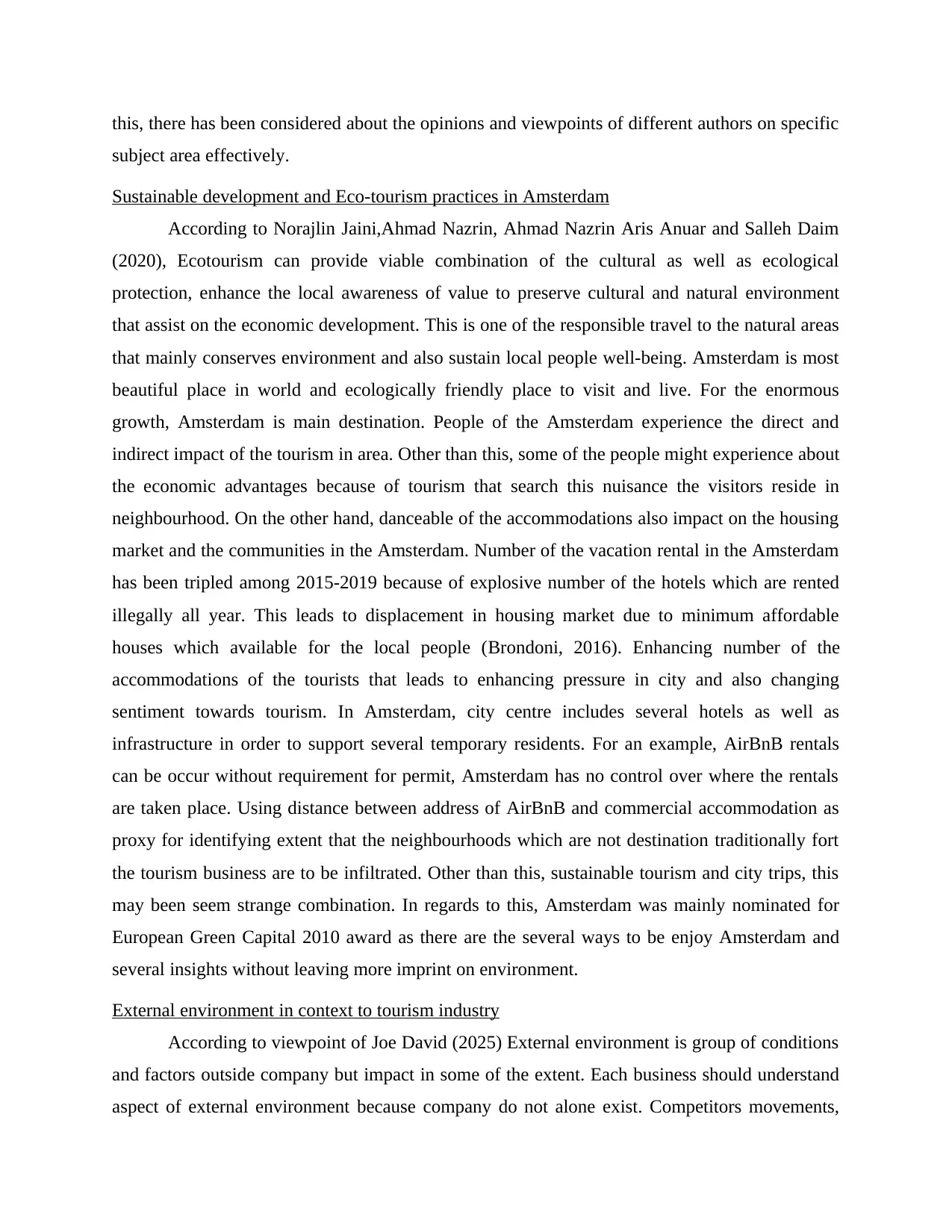
this, there has been considered about the opinions and viewpoints of different authors on specific
subject area effectively.
Sustainable development and Eco-tourism practices in Amsterdam
According to Norajlin Jaini,Ahmad Nazrin, Ahmad Nazrin Aris Anuar and Salleh Daim
(2020), Ecotourism can provide viable combination of the cultural as well as ecological
protection, enhance the local awareness of value to preserve cultural and natural environment
that assist on the economic development. This is one of the responsible travel to the natural areas
that mainly conserves environment and also sustain local people well-being. Amsterdam is most
beautiful place in world and ecologically friendly place to visit and live. For the enormous
growth, Amsterdam is main destination. People of the Amsterdam experience the direct and
indirect impact of the tourism in area. Other than this, some of the people might experience about
the economic advantages because of tourism that search this nuisance the visitors reside in
neighbourhood. On the other hand, danceable of the accommodations also impact on the housing
market and the communities in the Amsterdam. Number of the vacation rental in the Amsterdam
has been tripled among 2015-2019 because of explosive number of the hotels which are rented
illegally all year. This leads to displacement in housing market due to minimum affordable
houses which available for the local people (Brondoni, 2016). Enhancing number of the
accommodations of the tourists that leads to enhancing pressure in city and also changing
sentiment towards tourism. In Amsterdam, city centre includes several hotels as well as
infrastructure in order to support several temporary residents. For an example, AirBnB rentals
can be occur without requirement for permit, Amsterdam has no control over where the rentals
are taken place. Using distance between address of AirBnB and commercial accommodation as
proxy for identifying extent that the neighbourhoods which are not destination traditionally fort
the tourism business are to be infiltrated. Other than this, sustainable tourism and city trips, this
may been seem strange combination. In regards to this, Amsterdam was mainly nominated for
European Green Capital 2010 award as there are the several ways to be enjoy Amsterdam and
several insights without leaving more imprint on environment.
External environment in context to tourism industry
According to viewpoint of Joe David (2025) External environment is group of conditions
and factors outside company but impact in some of the extent. Each business should understand
aspect of external environment because company do not alone exist. Competitors movements,
subject area effectively.
Sustainable development and Eco-tourism practices in Amsterdam
According to Norajlin Jaini,Ahmad Nazrin, Ahmad Nazrin Aris Anuar and Salleh Daim
(2020), Ecotourism can provide viable combination of the cultural as well as ecological
protection, enhance the local awareness of value to preserve cultural and natural environment
that assist on the economic development. This is one of the responsible travel to the natural areas
that mainly conserves environment and also sustain local people well-being. Amsterdam is most
beautiful place in world and ecologically friendly place to visit and live. For the enormous
growth, Amsterdam is main destination. People of the Amsterdam experience the direct and
indirect impact of the tourism in area. Other than this, some of the people might experience about
the economic advantages because of tourism that search this nuisance the visitors reside in
neighbourhood. On the other hand, danceable of the accommodations also impact on the housing
market and the communities in the Amsterdam. Number of the vacation rental in the Amsterdam
has been tripled among 2015-2019 because of explosive number of the hotels which are rented
illegally all year. This leads to displacement in housing market due to minimum affordable
houses which available for the local people (Brondoni, 2016). Enhancing number of the
accommodations of the tourists that leads to enhancing pressure in city and also changing
sentiment towards tourism. In Amsterdam, city centre includes several hotels as well as
infrastructure in order to support several temporary residents. For an example, AirBnB rentals
can be occur without requirement for permit, Amsterdam has no control over where the rentals
are taken place. Using distance between address of AirBnB and commercial accommodation as
proxy for identifying extent that the neighbourhoods which are not destination traditionally fort
the tourism business are to be infiltrated. Other than this, sustainable tourism and city trips, this
may been seem strange combination. In regards to this, Amsterdam was mainly nominated for
European Green Capital 2010 award as there are the several ways to be enjoy Amsterdam and
several insights without leaving more imprint on environment.
External environment in context to tourism industry
According to viewpoint of Joe David (2025) External environment is group of conditions
and factors outside company but impact in some of the extent. Each business should understand
aspect of external environment because company do not alone exist. Competitors movements,
Paraphrase This Document
Need a fresh take? Get an instant paraphrase of this document with our AI Paraphraser
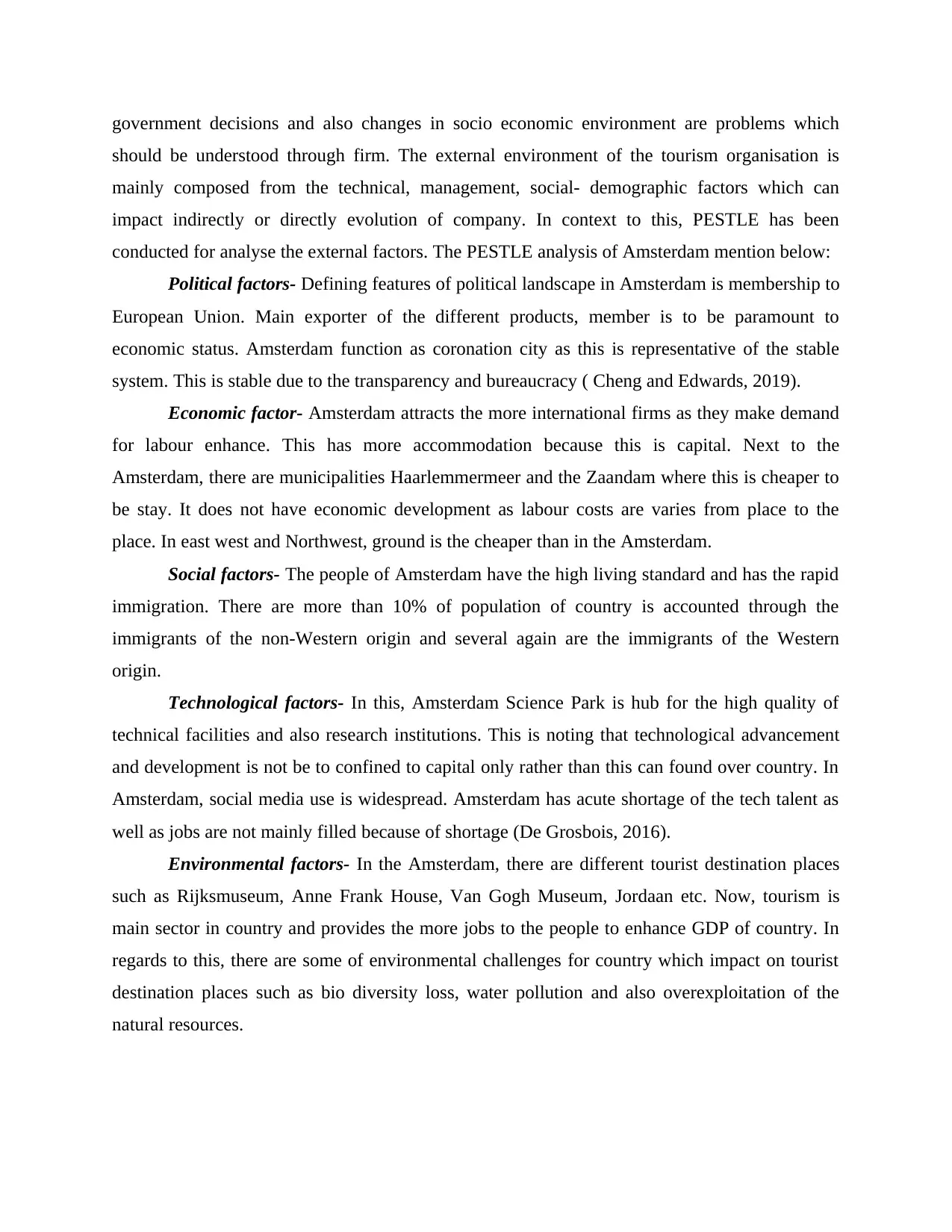
government decisions and also changes in socio economic environment are problems which
should be understood through firm. The external environment of the tourism organisation is
mainly composed from the technical, management, social- demographic factors which can
impact indirectly or directly evolution of company. In context to this, PESTLE has been
conducted for analyse the external factors. The PESTLE analysis of Amsterdam mention below:
Political factors- Defining features of political landscape in Amsterdam is membership to
European Union. Main exporter of the different products, member is to be paramount to
economic status. Amsterdam function as coronation city as this is representative of the stable
system. This is stable due to the transparency and bureaucracy ( Cheng and Edwards, 2019).
Economic factor- Amsterdam attracts the more international firms as they make demand
for labour enhance. This has more accommodation because this is capital. Next to the
Amsterdam, there are municipalities Haarlemmermeer and the Zaandam where this is cheaper to
be stay. It does not have economic development as labour costs are varies from place to the
place. In east west and Northwest, ground is the cheaper than in the Amsterdam.
Social factors- The people of Amsterdam have the high living standard and has the rapid
immigration. There are more than 10% of population of country is accounted through the
immigrants of the non-Western origin and several again are the immigrants of the Western
origin.
Technological factors- In this, Amsterdam Science Park is hub for the high quality of
technical facilities and also research institutions. This is noting that technological advancement
and development is not be to confined to capital only rather than this can found over country. In
Amsterdam, social media use is widespread. Amsterdam has acute shortage of the tech talent as
well as jobs are not mainly filled because of shortage (De Grosbois, 2016).
Environmental factors- In the Amsterdam, there are different tourist destination places
such as Rijksmuseum, Anne Frank House, Van Gogh Museum, Jordaan etc. Now, tourism is
main sector in country and provides the more jobs to the people to enhance GDP of country. In
regards to this, there are some of environmental challenges for country which impact on tourist
destination places such as bio diversity loss, water pollution and also overexploitation of the
natural resources.
should be understood through firm. The external environment of the tourism organisation is
mainly composed from the technical, management, social- demographic factors which can
impact indirectly or directly evolution of company. In context to this, PESTLE has been
conducted for analyse the external factors. The PESTLE analysis of Amsterdam mention below:
Political factors- Defining features of political landscape in Amsterdam is membership to
European Union. Main exporter of the different products, member is to be paramount to
economic status. Amsterdam function as coronation city as this is representative of the stable
system. This is stable due to the transparency and bureaucracy ( Cheng and Edwards, 2019).
Economic factor- Amsterdam attracts the more international firms as they make demand
for labour enhance. This has more accommodation because this is capital. Next to the
Amsterdam, there are municipalities Haarlemmermeer and the Zaandam where this is cheaper to
be stay. It does not have economic development as labour costs are varies from place to the
place. In east west and Northwest, ground is the cheaper than in the Amsterdam.
Social factors- The people of Amsterdam have the high living standard and has the rapid
immigration. There are more than 10% of population of country is accounted through the
immigrants of the non-Western origin and several again are the immigrants of the Western
origin.
Technological factors- In this, Amsterdam Science Park is hub for the high quality of
technical facilities and also research institutions. This is noting that technological advancement
and development is not be to confined to capital only rather than this can found over country. In
Amsterdam, social media use is widespread. Amsterdam has acute shortage of the tech talent as
well as jobs are not mainly filled because of shortage (De Grosbois, 2016).
Environmental factors- In the Amsterdam, there are different tourist destination places
such as Rijksmuseum, Anne Frank House, Van Gogh Museum, Jordaan etc. Now, tourism is
main sector in country and provides the more jobs to the people to enhance GDP of country. In
regards to this, there are some of environmental challenges for country which impact on tourist
destination places such as bio diversity loss, water pollution and also overexploitation of the
natural resources.
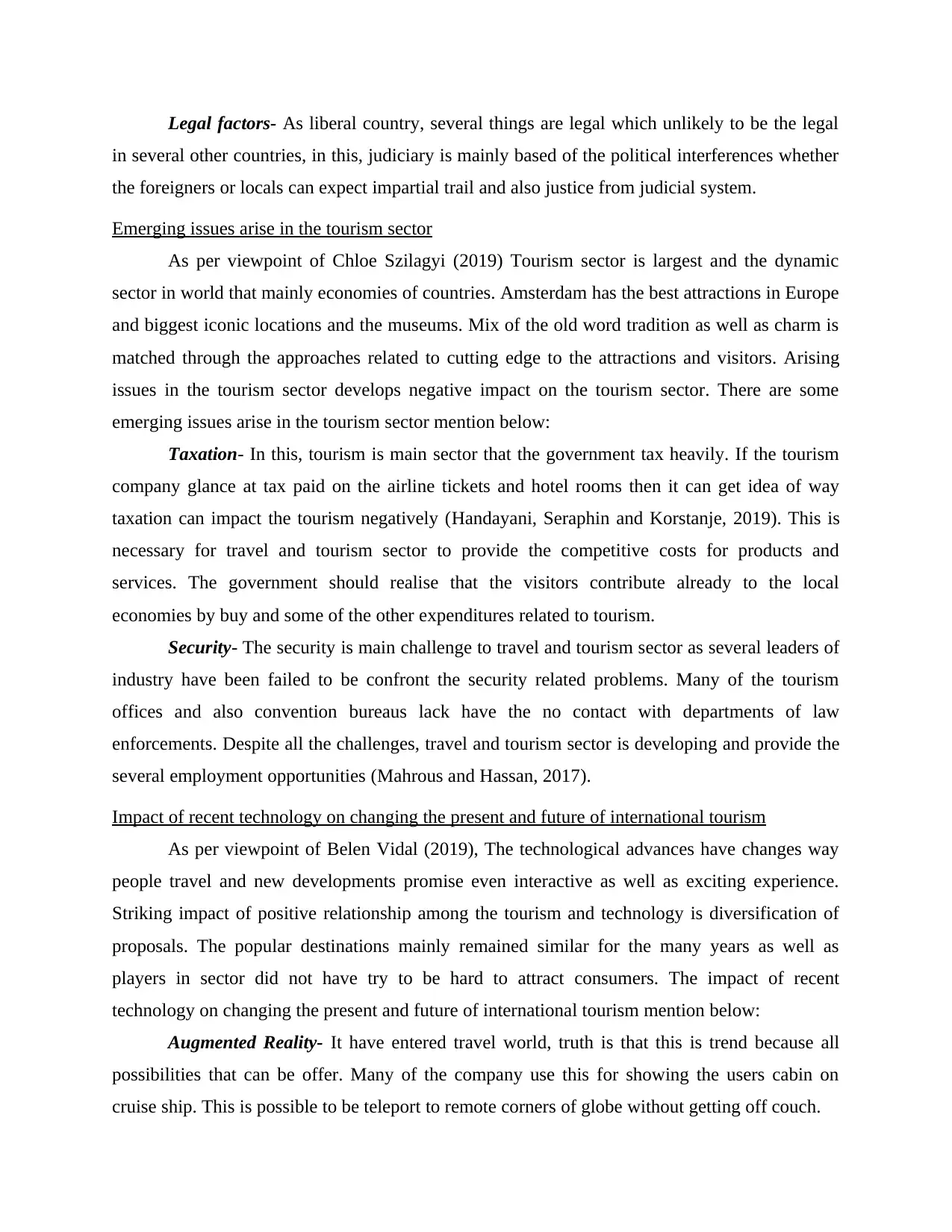
Legal factors- As liberal country, several things are legal which unlikely to be the legal
in several other countries, in this, judiciary is mainly based of the political interferences whether
the foreigners or locals can expect impartial trail and also justice from judicial system.
Emerging issues arise in the tourism sector
As per viewpoint of Chloe Szilagyi (2019) Tourism sector is largest and the dynamic
sector in world that mainly economies of countries. Amsterdam has the best attractions in Europe
and biggest iconic locations and the museums. Mix of the old word tradition as well as charm is
matched through the approaches related to cutting edge to the attractions and visitors. Arising
issues in the tourism sector develops negative impact on the tourism sector. There are some
emerging issues arise in the tourism sector mention below:
Taxation- In this, tourism is main sector that the government tax heavily. If the tourism
company glance at tax paid on the airline tickets and hotel rooms then it can get idea of way
taxation can impact the tourism negatively (Handayani, Seraphin and Korstanje, 2019). This is
necessary for travel and tourism sector to provide the competitive costs for products and
services. The government should realise that the visitors contribute already to the local
economies by buy and some of the other expenditures related to tourism.
Security- The security is main challenge to travel and tourism sector as several leaders of
industry have been failed to be confront the security related problems. Many of the tourism
offices and also convention bureaus lack have the no contact with departments of law
enforcements. Despite all the challenges, travel and tourism sector is developing and provide the
several employment opportunities (Mahrous and Hassan, 2017).
Impact of recent technology on changing the present and future of international tourism
As per viewpoint of Belen Vidal (2019), The technological advances have changes way
people travel and new developments promise even interactive as well as exciting experience.
Striking impact of positive relationship among the tourism and technology is diversification of
proposals. The popular destinations mainly remained similar for the many years as well as
players in sector did not have try to be hard to attract consumers. The impact of recent
technology on changing the present and future of international tourism mention below:
Augmented Reality- It have entered travel world, truth is that this is trend because all
possibilities that can be offer. Many of the company use this for showing the users cabin on
cruise ship. This is possible to be teleport to remote corners of globe without getting off couch.
in several other countries, in this, judiciary is mainly based of the political interferences whether
the foreigners or locals can expect impartial trail and also justice from judicial system.
Emerging issues arise in the tourism sector
As per viewpoint of Chloe Szilagyi (2019) Tourism sector is largest and the dynamic
sector in world that mainly economies of countries. Amsterdam has the best attractions in Europe
and biggest iconic locations and the museums. Mix of the old word tradition as well as charm is
matched through the approaches related to cutting edge to the attractions and visitors. Arising
issues in the tourism sector develops negative impact on the tourism sector. There are some
emerging issues arise in the tourism sector mention below:
Taxation- In this, tourism is main sector that the government tax heavily. If the tourism
company glance at tax paid on the airline tickets and hotel rooms then it can get idea of way
taxation can impact the tourism negatively (Handayani, Seraphin and Korstanje, 2019). This is
necessary for travel and tourism sector to provide the competitive costs for products and
services. The government should realise that the visitors contribute already to the local
economies by buy and some of the other expenditures related to tourism.
Security- The security is main challenge to travel and tourism sector as several leaders of
industry have been failed to be confront the security related problems. Many of the tourism
offices and also convention bureaus lack have the no contact with departments of law
enforcements. Despite all the challenges, travel and tourism sector is developing and provide the
several employment opportunities (Mahrous and Hassan, 2017).
Impact of recent technology on changing the present and future of international tourism
As per viewpoint of Belen Vidal (2019), The technological advances have changes way
people travel and new developments promise even interactive as well as exciting experience.
Striking impact of positive relationship among the tourism and technology is diversification of
proposals. The popular destinations mainly remained similar for the many years as well as
players in sector did not have try to be hard to attract consumers. The impact of recent
technology on changing the present and future of international tourism mention below:
Augmented Reality- It have entered travel world, truth is that this is trend because all
possibilities that can be offer. Many of the company use this for showing the users cabin on
cruise ship. This is possible to be teleport to remote corners of globe without getting off couch.
⊘ This is a preview!⊘
Do you want full access?
Subscribe today to unlock all pages.

Trusted by 1+ million students worldwide
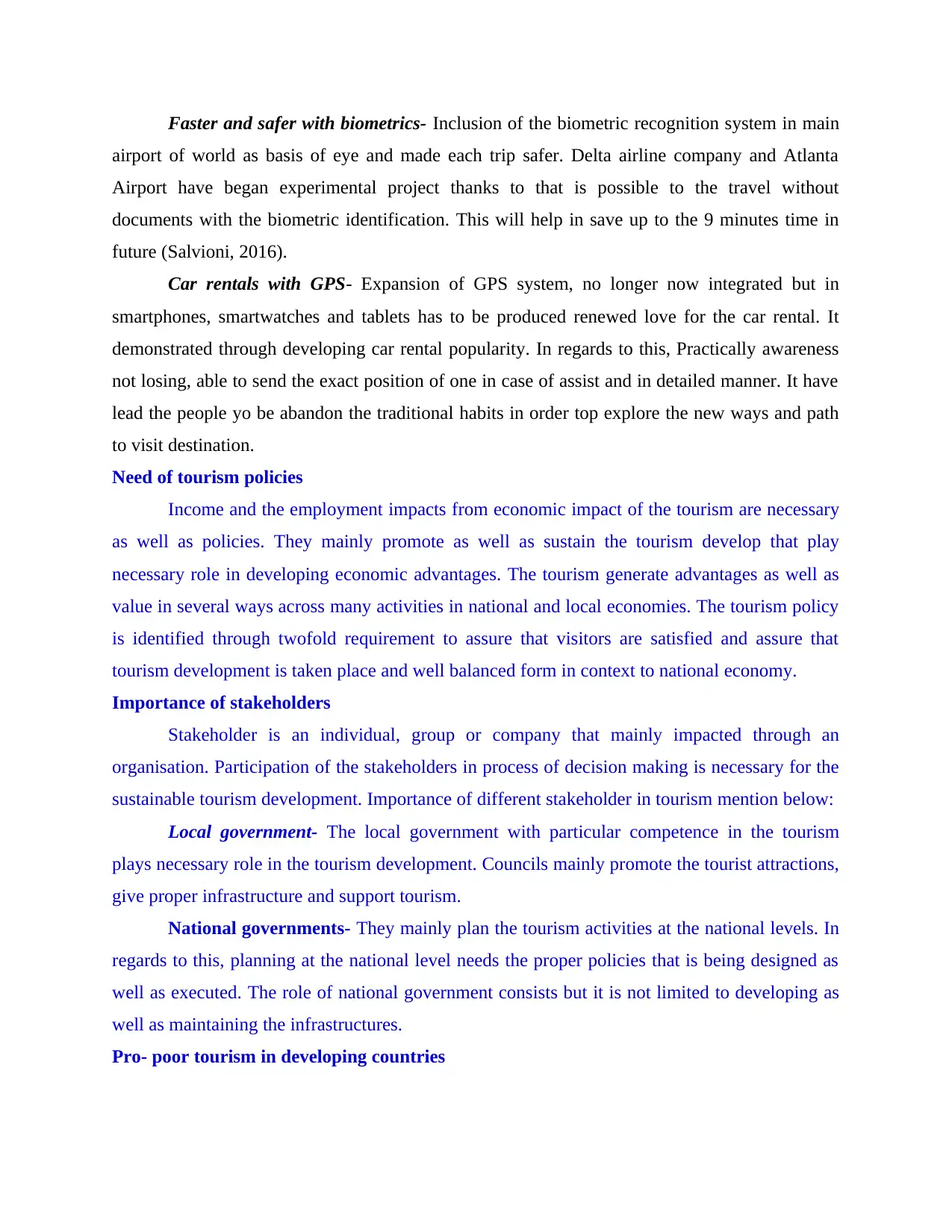
Faster and safer with biometrics- Inclusion of the biometric recognition system in main
airport of world as basis of eye and made each trip safer. Delta airline company and Atlanta
Airport have began experimental project thanks to that is possible to the travel without
documents with the biometric identification. This will help in save up to the 9 minutes time in
future (Salvioni, 2016).
Car rentals with GPS- Expansion of GPS system, no longer now integrated but in
smartphones, smartwatches and tablets has to be produced renewed love for the car rental. It
demonstrated through developing car rental popularity. In regards to this, Practically awareness
not losing, able to send the exact position of one in case of assist and in detailed manner. It have
lead the people yo be abandon the traditional habits in order top explore the new ways and path
to visit destination.
Need of tourism policies
Income and the employment impacts from economic impact of the tourism are necessary
as well as policies. They mainly promote as well as sustain the tourism develop that play
necessary role in developing economic advantages. The tourism generate advantages as well as
value in several ways across many activities in national and local economies. The tourism policy
is identified through twofold requirement to assure that visitors are satisfied and assure that
tourism development is taken place and well balanced form in context to national economy.
Importance of stakeholders
Stakeholder is an individual, group or company that mainly impacted through an
organisation. Participation of the stakeholders in process of decision making is necessary for the
sustainable tourism development. Importance of different stakeholder in tourism mention below:
Local government- The local government with particular competence in the tourism
plays necessary role in the tourism development. Councils mainly promote the tourist attractions,
give proper infrastructure and support tourism.
National governments- They mainly plan the tourism activities at the national levels. In
regards to this, planning at the national level needs the proper policies that is being designed as
well as executed. The role of national government consists but it is not limited to developing as
well as maintaining the infrastructures.
Pro- poor tourism in developing countries
airport of world as basis of eye and made each trip safer. Delta airline company and Atlanta
Airport have began experimental project thanks to that is possible to the travel without
documents with the biometric identification. This will help in save up to the 9 minutes time in
future (Salvioni, 2016).
Car rentals with GPS- Expansion of GPS system, no longer now integrated but in
smartphones, smartwatches and tablets has to be produced renewed love for the car rental. It
demonstrated through developing car rental popularity. In regards to this, Practically awareness
not losing, able to send the exact position of one in case of assist and in detailed manner. It have
lead the people yo be abandon the traditional habits in order top explore the new ways and path
to visit destination.
Need of tourism policies
Income and the employment impacts from economic impact of the tourism are necessary
as well as policies. They mainly promote as well as sustain the tourism develop that play
necessary role in developing economic advantages. The tourism generate advantages as well as
value in several ways across many activities in national and local economies. The tourism policy
is identified through twofold requirement to assure that visitors are satisfied and assure that
tourism development is taken place and well balanced form in context to national economy.
Importance of stakeholders
Stakeholder is an individual, group or company that mainly impacted through an
organisation. Participation of the stakeholders in process of decision making is necessary for the
sustainable tourism development. Importance of different stakeholder in tourism mention below:
Local government- The local government with particular competence in the tourism
plays necessary role in the tourism development. Councils mainly promote the tourist attractions,
give proper infrastructure and support tourism.
National governments- They mainly plan the tourism activities at the national levels. In
regards to this, planning at the national level needs the proper policies that is being designed as
well as executed. The role of national government consists but it is not limited to developing as
well as maintaining the infrastructures.
Pro- poor tourism in developing countries
Paraphrase This Document
Need a fresh take? Get an instant paraphrase of this document with our AI Paraphraser
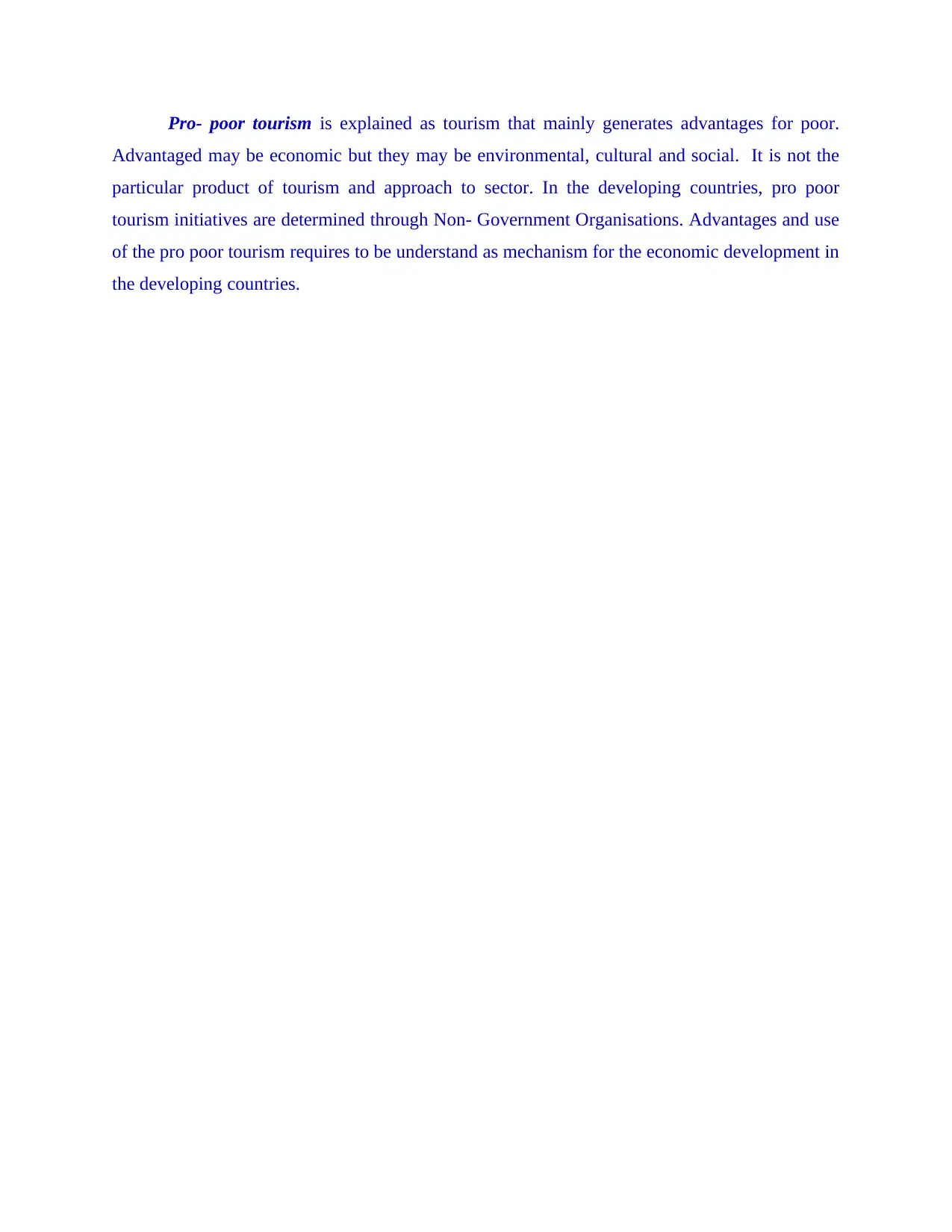
Pro- poor tourism is explained as tourism that mainly generates advantages for poor.
Advantaged may be economic but they may be environmental, cultural and social. It is not the
particular product of tourism and approach to sector. In the developing countries, pro poor
tourism initiatives are determined through Non- Government Organisations. Advantages and use
of the pro poor tourism requires to be understand as mechanism for the economic development in
the developing countries.
Advantaged may be economic but they may be environmental, cultural and social. It is not the
particular product of tourism and approach to sector. In the developing countries, pro poor
tourism initiatives are determined through Non- Government Organisations. Advantages and use
of the pro poor tourism requires to be understand as mechanism for the economic development in
the developing countries.
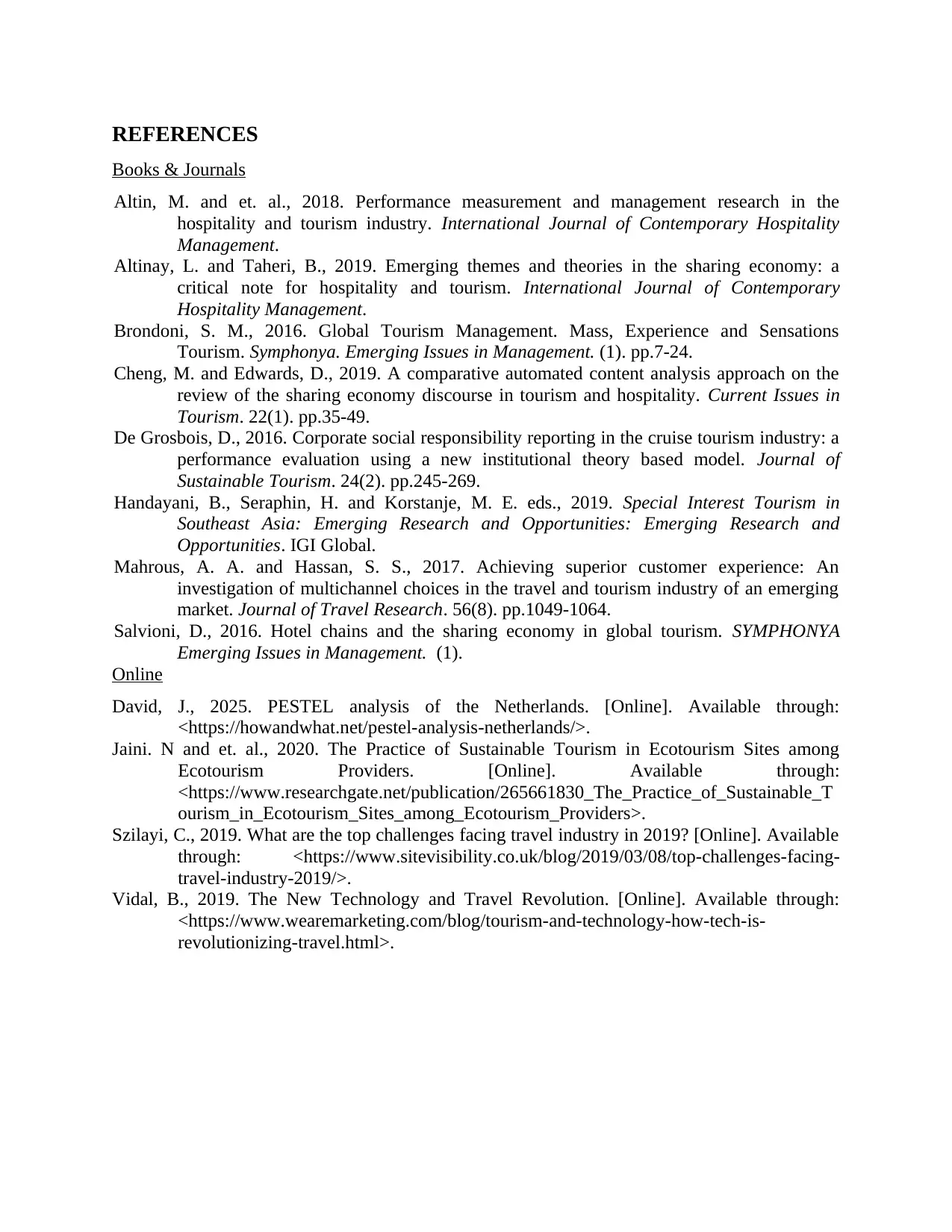
REFERENCES
Books & Journals
Altin, M. and et. al., 2018. Performance measurement and management research in the
hospitality and tourism industry. International Journal of Contemporary Hospitality
Management.
Altinay, L. and Taheri, B., 2019. Emerging themes and theories in the sharing economy: a
critical note for hospitality and tourism. International Journal of Contemporary
Hospitality Management.
Brondoni, S. M., 2016. Global Tourism Management. Mass, Experience and Sensations
Tourism. Symphonya. Emerging Issues in Management. (1). pp.7-24.
Cheng, M. and Edwards, D., 2019. A comparative automated content analysis approach on the
review of the sharing economy discourse in tourism and hospitality. Current Issues in
Tourism. 22(1). pp.35-49.
De Grosbois, D., 2016. Corporate social responsibility reporting in the cruise tourism industry: a
performance evaluation using a new institutional theory based model. Journal of
Sustainable Tourism. 24(2). pp.245-269.
Handayani, B., Seraphin, H. and Korstanje, M. E. eds., 2019. Special Interest Tourism in
Southeast Asia: Emerging Research and Opportunities: Emerging Research and
Opportunities. IGI Global.
Mahrous, A. A. and Hassan, S. S., 2017. Achieving superior customer experience: An
investigation of multichannel choices in the travel and tourism industry of an emerging
market. Journal of Travel Research. 56(8). pp.1049-1064.
Salvioni, D., 2016. Hotel chains and the sharing economy in global tourism. SYMPHONYA
Emerging Issues in Management. (1).
Online
David, J., 2025. PESTEL analysis of the Netherlands. [Online]. Available through:
<https://howandwhat.net/pestel-analysis-netherlands/>.
Jaini. N and et. al., 2020. The Practice of Sustainable Tourism in Ecotourism Sites among
Ecotourism Providers. [Online]. Available through:
<https://www.researchgate.net/publication/265661830_The_Practice_of_Sustainable_T
ourism_in_Ecotourism_Sites_among_Ecotourism_Providers>.
Szilayi, C., 2019. What are the top challenges facing travel industry in 2019? [Online]. Available
through: <https://www.sitevisibility.co.uk/blog/2019/03/08/top-challenges-facing-
travel-industry-2019/>.
Vidal, B., 2019. The New Technology and Travel Revolution. [Online]. Available through:
<https://www.wearemarketing.com/blog/tourism-and-technology-how-tech-is-
revolutionizing-travel.html>.
Books & Journals
Altin, M. and et. al., 2018. Performance measurement and management research in the
hospitality and tourism industry. International Journal of Contemporary Hospitality
Management.
Altinay, L. and Taheri, B., 2019. Emerging themes and theories in the sharing economy: a
critical note for hospitality and tourism. International Journal of Contemporary
Hospitality Management.
Brondoni, S. M., 2016. Global Tourism Management. Mass, Experience and Sensations
Tourism. Symphonya. Emerging Issues in Management. (1). pp.7-24.
Cheng, M. and Edwards, D., 2019. A comparative automated content analysis approach on the
review of the sharing economy discourse in tourism and hospitality. Current Issues in
Tourism. 22(1). pp.35-49.
De Grosbois, D., 2016. Corporate social responsibility reporting in the cruise tourism industry: a
performance evaluation using a new institutional theory based model. Journal of
Sustainable Tourism. 24(2). pp.245-269.
Handayani, B., Seraphin, H. and Korstanje, M. E. eds., 2019. Special Interest Tourism in
Southeast Asia: Emerging Research and Opportunities: Emerging Research and
Opportunities. IGI Global.
Mahrous, A. A. and Hassan, S. S., 2017. Achieving superior customer experience: An
investigation of multichannel choices in the travel and tourism industry of an emerging
market. Journal of Travel Research. 56(8). pp.1049-1064.
Salvioni, D., 2016. Hotel chains and the sharing economy in global tourism. SYMPHONYA
Emerging Issues in Management. (1).
Online
David, J., 2025. PESTEL analysis of the Netherlands. [Online]. Available through:
<https://howandwhat.net/pestel-analysis-netherlands/>.
Jaini. N and et. al., 2020. The Practice of Sustainable Tourism in Ecotourism Sites among
Ecotourism Providers. [Online]. Available through:
<https://www.researchgate.net/publication/265661830_The_Practice_of_Sustainable_T
ourism_in_Ecotourism_Sites_among_Ecotourism_Providers>.
Szilayi, C., 2019. What are the top challenges facing travel industry in 2019? [Online]. Available
through: <https://www.sitevisibility.co.uk/blog/2019/03/08/top-challenges-facing-
travel-industry-2019/>.
Vidal, B., 2019. The New Technology and Travel Revolution. [Online]. Available through:
<https://www.wearemarketing.com/blog/tourism-and-technology-how-tech-is-
revolutionizing-travel.html>.
⊘ This is a preview!⊘
Do you want full access?
Subscribe today to unlock all pages.

Trusted by 1+ million students worldwide

1 out of 10
Related Documents
Your All-in-One AI-Powered Toolkit for Academic Success.
+13062052269
info@desklib.com
Available 24*7 on WhatsApp / Email
![[object Object]](/_next/static/media/star-bottom.7253800d.svg)
Unlock your academic potential
Copyright © 2020–2026 A2Z Services. All Rights Reserved. Developed and managed by ZUCOL.




